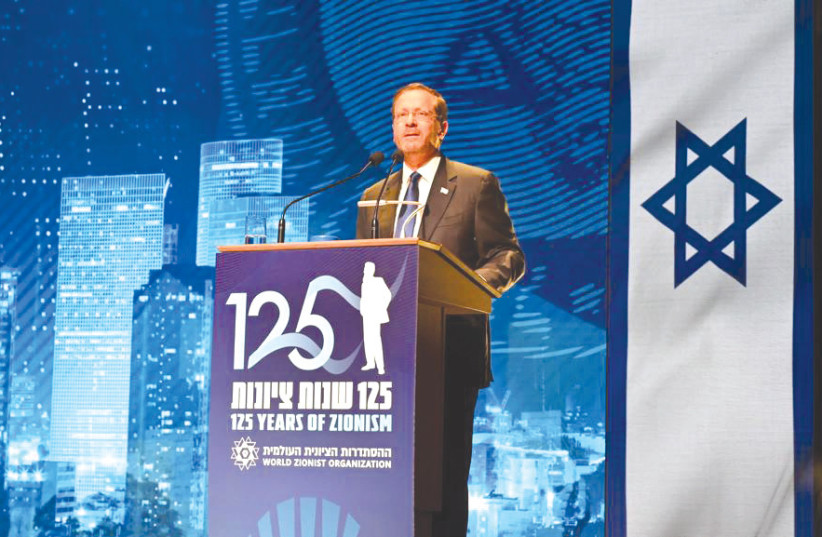In the summer of 2014, at the height of Operation Protective Edge in Gaza, as thousands of Hamas rockets rained on Israel, I was called to an emergency meeting in the US. Fully engaged in defending Israel in the international media, I was loathe to leave for even a single day, but the request was made by a major donor to Israeli causes and could not be easily refused. More compelling, though, was the subject of the “confab,” as the donor called it. Together with other Israeli writers, I would tackle the question: “Is Zionism dead?”
By dead, the donor did not mean Israel, per se, but rather the very word “Zionism.” The term, it was posited, had become irredeemably tainted in the West and especially on American campuses. Even pro-Israel Jews were reluctant to define themselves as Zionists. Any attempt at resuscitation would be useless. Instead, the national liberation movement of the Jewish people should adopt a new name, one that was less provocative and toxic. Our task, as Israelis, was to come up with a substitute.
I disagreed, forcibly, as did several other invitees. For well over 100 years, I recalled, Zionism was the idea that inspired generations of Jews to leave their homes to labor in the swamps and deserts, to fight off successive attempts at genocide, and reclaim their will to live after the Holocaust. Zionism gave hope to those who crossed the Ethiopian deserts or languished in Soviet prisons.
Zionism had produced one of the most dynamic, creative, powerful, and unerringly democratic nations in the world – the only “ism” of the 20th century to succeed and succeed massively. All that we would forget, I asked, just because some American students were labeling Zionism racist?

Why should we preserve Zionism?
Yet preserving the word “Zionism” was not only about honoring Israel’s achievements. On a far deeper level, Zionism had become integral to Jewish identity. Of course, one could be anti-Zionist – radical leftist or haredi – and still be Jewish, but by disavowing the nation-state of the Jewish people, home to the world’s largest Jewish community, the anti-Zionist Jew was opting out of our nation. The anti-Zionist Jew was a fugitive from sovereign responsibility, a refugee from Jewish history, a footnote.
Repudiating Zionism, moreover, failed to protect Jews from antisemitism. Supporters and detractors of Israel alike were barred from women’s rights marches and other progressive protests and targeted by neo-Nazis. The thugs who beat up Jews on American streets do not ask about their opinions on Israel.
RATHER THAN shaking my commitment to “Zionism,” the confab reinforced it. The meaning of the word had changed over the years, from a simple belief in the right of the Jewish people to self-determination in our ancient homeland to something much richer and more nuanced. Zionism was about Jewish strength and Jewish compassion, our ability to defend ourselves while selflessly assisting others.
Zionism was about balancing modernity with tradition, East and West, and diversity with national identity. Zionism was the testing ground for Jewish values, a barometer without which the integrity of those values cannot truly be gauged.
Zionism by any other name would still mean all of this, I argued at the confab, and Zionism by any other name would still be condemned by those who hate Israel. Rather than substituting another word for it, we should rally around Zionism and exalt it.
As patriots during the American Revolution transformed “Yankee Doodle Dandy,” a song devised by the British to mock them, into an anthem, so, too, must we embrace Zionism in the face of its detractors. While we must recognize the fact that Zionism has given rise to complex moral dilemmas, we must also relish the privilege of grappling with those dilemmas within the context of an independent Jewish state. “Zionist,” our motto should be, “and proud of it.”
I recalled that confab eight years later, last summer after another violent exchange with Gaza. Together with my grandchildren, I visited a water park in Holon. Thousands of children of different races, religions, and ethnic backgrounds splashed together in the fountains. This, too, is Zionism, I thought, the movement that created this haven only a day’s drive from Damascus, Baghdad and Beirut. This is Zionism, an idea well worth preserving and fighting for.
The writer – who served as Israel’s ambassador to the US (2009-2013), as an MK (2015-2019) and as deputy minister in the Prime Minister’s Office (2016-2019) – is the author of the forthcoming Swann’s War.
